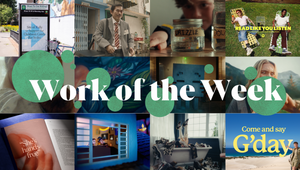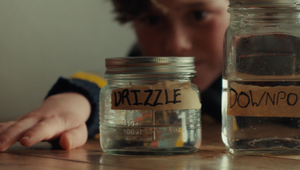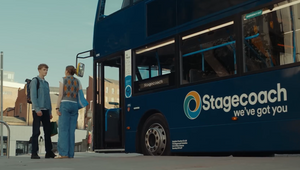
Finding The Spark That Brings Projects to Life with Nicholas Schrunk

Nicholas Schrunk is a three-time Emmy award-winning director known for his action and adventure visual storytelling. His feature documentary, ‘Blood Road,’ won the Emmy award for Outstanding Graphic Design and Art Direction; his action spectacle ‘The Dragon’ won for Outstanding Cinematography; and Formula 1 film ‘Vamos, Vegas!’ for Outstanding Sound.
Serving as the executive creative director for Red Bull for over a decade, Schrunk shaped influential and ambitious film and video productions for Red Bull as well as Porsche, Bentley, Chevrolet, and Audi. He has been published in American Cinematographer for his distinctive approach, blending scientific processes with traditional visual design, guided by brand strategy, to deliver emotionally resonant and technically groundbreaking work.
He's also been recognised for numerous awards, including a One Show Pencil for Film Craft: Innovation, A Cannes Lion for Cinematography and previously a Webby for Best Sports Film.
He sat down with LBB to discuss his approach to filmmaking, blending practical execution, cinematic storytelling, and an honest human hook…
Name: Nicholas Schrunk
Location: Los Angeles, CA
Repped by/in: Chief (UK), Harvest (USA)
Awards: Sports Emmy Awards – Outstanding Camera Work (2023), Outstanding Post-Produced Sound (2024), News & Documentary Emmy Awards – Outstanding Title Sequence (2018); Cannes Bronze Lion – Cinematography (2022); One Show Silver Pencil – Film Craft Innovation (2022); Webby – Best Sports Film
LBB> What elements of a script set one apart from the other, and what sort of scripts get you excited to shoot them?
Nicholas> I enjoy challenges in uncharted practical territory. I always drive visuals and production approaches back to a core story and its emotion, but I’m a firm believer that the mood and tone you experience while creating becomes the tone of the finished piece.
When I’m fully engaged – interested and problem-solving in a way that feels unexplored – whether that’s new camera formats, juxtaposing machines in places they’ve never belonged, or forging a fresh combination of humanity and action sequences, I find my best work shines through that professional curiosity.
LBB> How do you approach creating a treatment for a spot?
Nicholas> I usually build from a core visual that feels uniquely ownable and rooted in the story. It could be a big moment in an action sequence, a performance that casting and wardrobe need to absolutely nail, or a piece of music. If I can find the emotion and the spark that unlocks the world, I build the treatment around that, so I’m always north-starring toward something memorable and outstanding for the client.
With so much content online able to be emulated – from AI to inexpensive filmmaking tools – I want to ensure the high-quality work I deliver can not only compete but thrive next to content that doesn’t face the same guardrails of commercial or documentary production.
I was a graphic design and fine arts major in college, so I’ve always designed my own treatments. I find that designing them forces me to confront what falls into cliché and what truly excites me. Orchestrating these ideas into text and imagery on pages helps me own the idea and deliver strong verbal pitches, because I’ve already worked through the narrative structure and hierarchy in design.
I’m a fan of clarity over confusion – I’d rather have one unforgettable promise in a treatment than a moodboard that tries to be everything to everyone.
LBB> If the script is for a brand you’re not familiar with or don’t have a big affinity with, or a market you’re new to, how important is it for you to do research and understand that strategic and contextual side of the ad? If it’s important, how do you do it?
Nicholas> I work closely with a writing and research partner, and together we dig out everything we can: previous spots, cultural nuance, current events – all of this feeds into the zeitgeist we’re pushing to achieve. I’d estimate about 60% online research, 20% print/traditional research, and 20% drawn from my own image/video reference library.
If we’re selling a physical object, I want to know how it works and integrate that knowledge into my narrative. If it’s a talent-driven performance, I want to review references and briefs before the job even awards so I can understand how every piece fits together.
LBB> For you, what is the most important working relationship for a director to have with another person in making an ad? And why?
Nicholas> I’d say it’s a tie between the agency creatives and my director of photography. I’m a highly visual and technical director, but I always want a sparring partner – especially for action or automotive projects happening in the field – to help streamline decisions.
Agency creatives bring incredible insight, and I see it as my job to translate and problem-solve for production. With my DP, I love to dive deep on execution ideas. That back-and-forth dialogue helps inform the entire crew and allows us to work through variables before the pressure is on.
LBB> What type of work are you most passionate about — is there a particular genre or subject matter or style you are most drawn to?
Nicholas> While action and adventure sports represent some of the biggest efforts in my career, I believe documentary and scripted storytelling can create the strongest emotional responses when executed properly.
Combining those worlds is what I’m most drawn to — finding ways to bring stakes based in our humanity to action sequences. When that connection clicks, it creates an adrenaline rush like nothing else.
LBB> What misconception about you or your work do you most often encounter, and why is it wrong?
Nicholas> After working for Red Bull for 15+ years, 10 of those as their ECD in the US, people sometimes reduce my work to bold stunts and risk-taking. While that’s certainly an element, I pride myself on being at the intersection of science, technology, and art. I’m constantly looking for ways to use new techniques to tell the story of action while keeping the human emotional response front and centre.
LBB> What’s the craziest problem you’ve come across in the course of a production – and how did you solve it?
Nicholas> I’ve been gifted some incredible life experiences, but one standout was driving an F1 car through the middle of the Wynn Casino in Las Vegas. We had only three takes. The first two went well, but on the last one I had to ask the CEO of Wynn permission to do a tire burnout on his casino floor. Because we were so organized and confident, we got an enthusiastic yes – and it became the film’s cornerstone. I think projecting confidence and perseverance, without being reckless, creates the best opportunities.
LBB> How do you strike the balance between being open/collaborative with the agency and brand client while also protecting the idea?
Nicholas> In my experience, most creative teams are aligned in wanting to protect and push the idea. Challenges usually come from fear — fear of missing a shot on the boards, missing a product alt take, or changing creative based on logistics.
My role is to remove those fears by being organized and offering solutions in the moment, always staying calm and optimistic. What we do is incredible, and tackling it with optimism and detailed prep removes so much fear and negativity — which in turn protects the core ideas. I’d much rather avoid situations that require defending ideas by building confidence upfront.
LBB> What are your thoughts on opening up the production world to a more diverse pool of talent? Are you open to mentoring and apprenticeships on set?
Nicholas> Diversity in ideas, crew, collaborators, and perspectives is one of the healthiest professional ecosystems you can encourage. When diversity is empowered with the right tools and a collaborative environment — not just tacked on at the last stage — it’s invigorating. I love being challenged with new approaches or techniques, and absolutely support mentoring and apprenticeships to help build that future.
LBB> Your work is now presented in so many different formats — to what extent do you keep each in mind while you’re working (and, equally, to what degree is it possible to do so)?
I enjoy the challenge of creating images and emotions that work on anything from a five-year-old Android phone to a laser-projected 4K Dolby Vision theater. Every project is different, but the same principles apply: if the images and story are strong at their core, they’ll adapt across any screen.
LBB> What’s your relationship with new technology, and how do you incorporate future-facing tech into your work (e.g. virtual production, interactive storytelling, AI/data-driven visuals etc.)?
Nicholas> I’d say this is one of my most distinct qualities in pre-production. I’m a huge proponent of virtual production and pre-vis. Anything that brings creative alignment to a wide range of collaborators – heads of production, agency creatives, clients, and crew – is powerful for pushing concepts higher.
AI-driven generative tools have their place in speeding up processes and clarifying intention, but I still rely on hand-drawn storyboards, many drawn by me, to be specific and show 1:1 how branding and composition will work across all formats. On set, I’m often an early adopter of new tools.
For example, on a Porsche commercial I used the Freefly Systems WAVE camera flown by FPV – people thought it lacked dynamic range, but I saw the opportunity to push its limits. The visuals won multiple awards and ended up being one of the most creatively rewarding projects of my career. That appetite for exploring new tools is at the heart of how I keep my work fresh.
LBB> Which pieces of work do you feel really show off what you do best — and why?
Nicholas> My most prolific work has been with Red Bull over the past decade, blending high-level technical execution with complex logistics, practical locations, and live performance. The Red Bull Formula 1 – ‘Vamos, Vegas’ film is perhaps the highest-profile example of that approach, combining comedy, storytelling, and high-energy action seamlessly.
I’ve carried this same skill set into my work with Porsche and Bentley, bringing together ambitious technical execution and refined artistry. Porsche,‘Drive2Extremes’ and Bentley, ‘Power to Do’, both showcase my ability to merge cutting-edge technique with cinematic style.
One piece I’m perhaps most proud of is Lindsey Vonn – ‘Carving a Legacy’, the retirement campaign we launched the moment she crossed her final finish line. The project balanced emotion, immediacy, and documentary-style authenticity in a way that perfectly captured the stakes of her final chapter. Together, these projects really represent my style – blending practical execution, cinematic storytelling, and an honest human hook.















